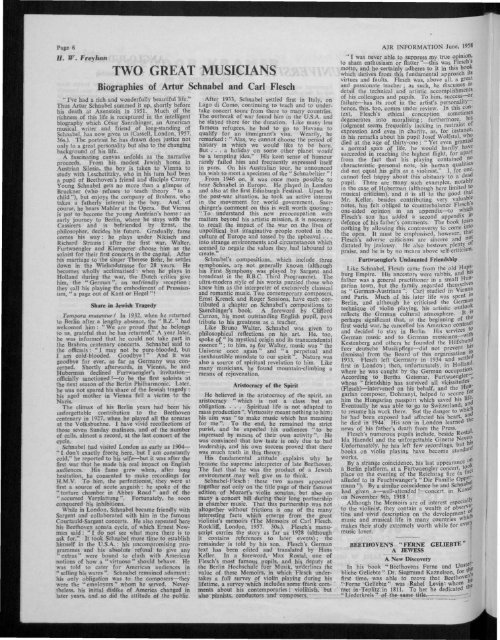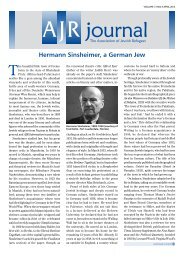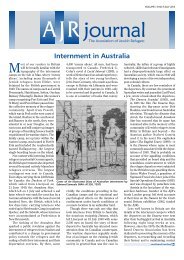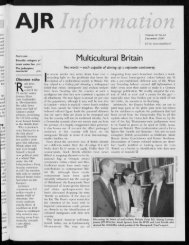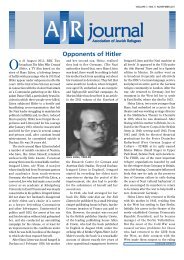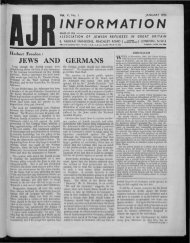Feuchtwanger (London) ltd. - The Association of Jewish Refugees
Feuchtwanger (London) ltd. - The Association of Jewish Refugees
Feuchtwanger (London) ltd. - The Association of Jewish Refugees
You also want an ePaper? Increase the reach of your titles
YUMPU automatically turns print PDFs into web optimized ePapers that Google loves.
Page 6<br />
H. W. Freyhan<br />
TWO GREAT MUSICIANS<br />
Biographies <strong>of</strong> Artur Schnabel and Carl Flesch<br />
" I've had a rich and wonderfully beautiful life."<br />
Thus Artur Schnabel summed it up, shortly before<br />
his death at Axenstein in 1951. Much <strong>of</strong> the<br />
richness <strong>of</strong> this life is recaptured in the intelligent<br />
biography which C^sar Saerchinger, an American<br />
musical writer and friend <strong>of</strong> long-standing <strong>of</strong><br />
Schnabel, has now given us (Cassell, <strong>London</strong>. 1957.<br />
36s.). <strong>The</strong> portrait he has drawn does justice not<br />
only to a great personality but also to the changing<br />
background <strong>of</strong> his life.<br />
A fascinating canvas unfolds as the narrative<br />
proceeds. From his modest <strong>Jewish</strong> home in<br />
Austrian Silesia, the boy is taken to Vienna to<br />
study with Leschetitzky, who in his turn had been<br />
a pupil <strong>of</strong> Beethoven's friend and disciple Czerny.<br />
Young Schnabel gets no more than a glimpse <strong>of</strong><br />
Bruckner (who refuses to teach theory " to a<br />
child"), but enjoys the company <strong>of</strong> Brahms, who<br />
takes a fatherly interest in the boy. And, <strong>of</strong><br />
course, he hears Mahler at the Opera. But Vienna<br />
is not to become the young Austrian's home : an<br />
early journey to Berlin, where he stays with thc<br />
Cassirers and is befriended by Ernst, the<br />
philosopher, decides his future. Gradually, fame<br />
comes his way: he plays under Nikisch and<br />
Richard Strauss: after the first war, Walter,<br />
Furtwaengler and Klemperer choose him as the<br />
soloist for their first concerts in the capital. After<br />
his marriage to the singer <strong>The</strong>rese Behr, he settles<br />
down in the Wielandstrasse for 28 years. He<br />
becomes wholly acclimatised : when he plays in<br />
Holland during the war, the Dutch critics give<br />
him, the " German", an unfriendly reception ;<br />
they call his playing the embodiment <strong>of</strong> Prussianism',<br />
"a page out <strong>of</strong> Kant or Hegel "!<br />
Share in <strong>Jewish</strong> Tragedy<br />
Tempora mutantur! In 1932, when he returned<br />
to Berlin after a lengthy absence, the " B.Z." had<br />
welcomed him : " We are proud that he belongs<br />
to us, grateful that he has returned." A year later,<br />
he was informed that he could not take part in<br />
the Brahms centenary concerts. Schnabel said to<br />
the <strong>of</strong>ficials : " I may not be pure-blooded, but<br />
I am cold-blooded. Goodbye!" And it was<br />
goodbye for ever, as far as Germany was concerned.<br />
Shortly afterwards, in Vienna, he and<br />
Huberman declined Furtwaengler's invitation—<br />
<strong>of</strong>ficially sanctioned !—to be the first soloists at<br />
the next season <strong>of</strong> the Berlin Philharmonic. Later,<br />
he was not spared his share <strong>of</strong> the <strong>Jewish</strong> tragedy :<br />
his aged mother in Vienna fell a victim to the<br />
Nazis.<br />
<strong>The</strong> climax <strong>of</strong> his Berlin years had been his<br />
unforgettable contribution to the Beethoven<br />
centenary in 1927, when he played all the sonatas<br />
at the Volksbuehne. I have vivid recollections <strong>of</strong><br />
those seven Sunday matinees, and <strong>of</strong> the number<br />
<strong>of</strong> calls, almost a record, at the last concert <strong>of</strong> the<br />
cycle.<br />
Schnabel had visited <strong>London</strong> as early as 1904—<br />
" I don't exactly freeze here, but I am constantly<br />
cold," he reported to his wife—but it was after the<br />
first war that he made his real impact on English<br />
audiences. His fame grew when, after long<br />
hesitation, he consented to make recordings for<br />
H.M.V. To him, the perfectionist,' they were at<br />
first a source <strong>of</strong> acute anguish : he spoke <strong>of</strong> the<br />
" torture chamber in Abbey Road" and <strong>of</strong> the<br />
" accursed Verplattung ". Fortunately, he soon<br />
conquered his inhibitions.<br />
While in <strong>London</strong>, Schnabel became friendly with<br />
Sargent and collaborated with him in the famous<br />
Courtauld-Sargent concerts. He also repeated here<br />
his Beethoven sonata cycle, <strong>of</strong> which Emest Newman<br />
said : " I do not see what more there is to<br />
ask for." It took Schnabel more time to establish<br />
himself in the U.S.A. : his uncompromising programmes<br />
and his absolute refusal to give any<br />
" extras" were bound to clash with American<br />
notions <strong>of</strong> how a " virtuoso " should behave. He<br />
was told to cater for American audiences in<br />
" selling his wares ". Schnabel remained adamant :<br />
his only obligation was to the composers—they<br />
were the " emoloyers " whom he served. Nevertheless,<br />
his initial dislike <strong>of</strong> America changed in<br />
later years, and so did the attitude <strong>of</strong> the public.<br />
After 1933, Schnabel settled first in Italy, on<br />
Lago di Como, continuing to teach and to undertake<br />
concert tours from there to many countries.<br />
<strong>The</strong> outbreak <strong>of</strong> war found him in the U.S.A. and<br />
he stayed there for the duration. Like many less<br />
famous refugees, he had to go to Havana to<br />
qualify for an immigrant's visa. Wearily, he<br />
remarked : " Alas, we cannot choose the period <strong>of</strong><br />
history in which we would like to be born.<br />
But ... a holiday on some other planet would<br />
be a tempting idea." His keen sense <strong>of</strong> humour<br />
rarely failed him and frequently expressed itself<br />
in puns. On his AustraUan tour, he announced<br />
his wish to meet a specimen <strong>of</strong> the " Schnabeltier "!<br />
From 1946 on, it was once more possible to<br />
hear Schnabel in Europe. He played in <strong>London</strong><br />
and also at the first Edinburgh Festival. Upset by<br />
the post-war situation, he took an active interest<br />
in the movement for world government. Saerchinger's<br />
comment on this is well worth quoting :<br />
" To understand this new preoccupation with<br />
matters beyond his artistic mission, it is necessary<br />
to recaU the impact <strong>of</strong> the war on the lives <strong>of</strong><br />
unpolitical but imaginative people rooted in the<br />
culture <strong>of</strong> Europe and tossed by the upheaval . . .<br />
into strange environments and circumstances which<br />
seemed to negate the values they had laboured to<br />
create."<br />
Schnabel's compositions, which include three<br />
symphonies, are not generally known (although<br />
his First Symphony was played by Sargent and<br />
broadcast in the B.B.C. Third Programme). <strong>The</strong><br />
ultra-modern style <strong>of</strong> his works puzzled those who<br />
knew him as the interpreter <strong>of</strong> exclusively classical<br />
and romantic music. Two contemporary composers,<br />
Ernst Krenek and Roger Sessions, have each contributed<br />
a chapter on Schnabel's compositions to<br />
Saerchinger's book. A foreword by Clifford<br />
Curzon, his most outstanding English pupil, pays<br />
tribute to his greatness as a teacher.<br />
Like Bruno Walter, Schnabel was given to<br />
philosophical reflections on his art. He, too,<br />
spoke <strong>of</strong> " its mystical origin and its transcendental<br />
essence " ; to him, as for Walter, music was " the<br />
Universe once again" and " a perpetual and<br />
inexhaustible mandate to our spirit". Nature was<br />
also a source <strong>of</strong> spiritual revelation to him. Like<br />
many musicians, he found mountain-climbing a<br />
means <strong>of</strong> rejuvenation.<br />
Aristocracy <strong>of</strong> the Spirit<br />
He believed in the aristocracy <strong>of</strong> the spirit, an<br />
aristocracy " which is not a class but an<br />
obligation. . . . Spiritual life is not adapted to<br />
mass production ". Virtuosity meant nothing to him;<br />
his aim was " to make music which has meaning<br />
for me". To the end, he remained the strict<br />
purist, and he expected his audiences " to be<br />
impressed by means <strong>of</strong> their own activity ". He<br />
was convinced that low taste is only due to bad<br />
leadership, and his own success proved that there<br />
was much truth in this theory.<br />
His fundamental attitude explains why he<br />
became the supreme interpreter <strong>of</strong> late Beethoven.<br />
<strong>The</strong> fact that he was the product <strong>of</strong> a <strong>Jewish</strong><br />
environment may well give us to think.<br />
Schnabel-Flesch : these two names appeared<br />
together not only on the title page <strong>of</strong> their famous<br />
edition <strong>of</strong> Mozart's violin sonatas, but also on<br />
many a concert bill during their long partnership<br />
in chamber music. That this partnership was not<br />
altogether without frictions is one <strong>of</strong> the many<br />
interesting facts which emerge from the great<br />
violinist's memoirs (<strong>The</strong> Memoirs <strong>of</strong> Carl Flesch.<br />
Rockliff, <strong>London</strong>, 1957. 30s.). Flesch's manuscript<br />
carries the story as far as 1928 (although<br />
it contains references to later events); the<br />
remainder is told by his son. Flesch's German<br />
text has been edited and translated by Hans<br />
Keller. In a foreword,- Max Rostal, one <strong>of</strong><br />
Flesch's most famous pupils, and his deputy at<br />
the Berlin Hochschule fuer Musik, underlines the<br />
value <strong>of</strong> these Memoirs, in which Flesch undertakes<br />
a full survey <strong>of</strong> violin playing during his<br />
lifetime, a survey which includes some- frank com- "<br />
ments about his contemporaries : violihisfs, but<br />
also pianists, conductors -and composers.--7;^ - --<br />
AJR INFORMATION June, 1958<br />
" I was never able to suppress my true opinion,<br />
to sham enthusiasm or flatter "—this was Flesch s<br />
motto, and he certainly adheres to it in this book<br />
which derives from this fundamental approach its<br />
virtues and faults. Flesch was, above all. a gre?"^<br />
and passionate teacher ; as such, he discusses in<br />
detail the technical and artistic accomplishments<br />
<strong>of</strong> his coUeagues and pupils. To him, success—or<br />
failure—has its root in the artist's personality<br />
hence, this, too, comes under review. In this context,<br />
Flesch's ethical conception sometirnes<br />
degenerates into moralising; furthermore, his<br />
judgment seems frequeiitly lacking in restraint ot<br />
expression and even in charity, as, for instance,<br />
in his remarks about his pupil Josef Wolfstal, who<br />
died at the age <strong>of</strong> thirty-one : " Yet even granted<br />
a normal span <strong>of</strong> life, he would hardly have<br />
succeeded in reaching the highest flight, for apart<br />
from the fact that his playing contained no<br />
characteristic personal note, his human qualities<br />
did not equal his gifts as a violinist." 1, for one.<br />
cannot feel happy about this obituary to a dead<br />
pupil. <strong>The</strong>re are many such examples, notably<br />
in the case <strong>of</strong> Huberman (although here limited to<br />
musical criticism), and it is all to the good that<br />
Mr. Keller, besides contributing very valuable<br />
notes, has felt obUged to counterbalance Flesens<br />
one-sided opinion in an appendix—to whic"<br />
Flesch's son has added a second appendix 1"<br />
defence <strong>of</strong> his father's comments. <strong>The</strong> book los^^<br />
nothing by allowing this controversy to come in'°<br />
the open. It must be emphasised, however, that<br />
Flesch's adverse criticisms are sincere and no<br />
dictated by jealousy. He also bestows plenty 01<br />
praise, and he is by no means above self-critic'sr"-<br />
Furtwaengler's Undaunted Friendship<br />
Like Schnabel, Flesch came from the old Hap?'<br />
burg Empire. His ancestors were rabbis, and W^<br />
father was a general practitioner in a small H""'<br />
garian town, but the family regarded themseWe<br />
as " German-Austrians ". Carl studied in Vienna<br />
and Paris. Much <strong>of</strong> his later life was spent i"<br />
Beriin, and although he criticised the German<br />
technique <strong>of</strong> violin playing, his artistic outlook<br />
reflects the German cultural atmosphere. 1' '<br />
perhaps significant that, at the beginning <strong>of</strong> "^<br />
first world war, he cancelled his American contrac<br />
and decided to stay in Berlin. His services j<br />
German music and to German musicians—^',<br />
Kestenberg and others he founded the Hilfsbun"<br />
fuer deutsche Musikpflege—did not prevent ni<br />
dismissal from the Board <strong>of</strong> this organisation',<br />
1933. Flesch left Germany in 1934 and settK'<br />
first in <strong>London</strong> ; then, unfortunately, in Hollan"'<br />
where he was caught by the German occupatioji-<br />
According to Bertha Geismar, Furtwaengler''^<br />
whose "friendship has survived all vicissitudes<br />
(Flesch)—intervened on his behalf, and the Hunj^<br />
garian composer, Dohnanyi, helped to secure i"<br />
him the Hungarian passport which saved his h^^'<br />
Eventually he was able to go to Switzerland, an<br />
to resume his work there. But the danger to ^"'^jj<br />
he had been exposed had affected his heart, an<br />
he died in 1944. His son in <strong>London</strong> learned i"<br />
news <strong>of</strong> his father's death from the Press. j<br />
Flesch's numerous pupils include, beside Rosta ><br />
Ida Haendel and the unforgettable Ginette Neve"^<br />
Unfortunately, he has left few recordings, but ^.<br />
books on violin playing have become standa><br />
works. I,<br />
By a strange coincidence, his last appearance 0<br />
a Berlin platform, at a Furtwaengler concert, ^°°^<br />
place on the evening <strong>of</strong> the Reichstag fire (a t^<br />
alluded to in <strong>Feuchtwanger</strong>'s "Die Familie OPPf^l<br />
mann "). By a similar coincidence he and Schna^<br />
had given a—well-attended !—concert in Kass<br />
on November 9th, 1918 ! . ..,,<br />
Although the Memoirs are <strong>of</strong> interest especial ^<br />
to the violinist, they contain a wealth <strong>of</strong> observ<br />
tion and vivid description on the development .j^<br />
music and musical life in many countries *"' y<br />
makes their study extremely worth while for eveu<br />
music lover. ;<br />
BEETHOVEN'S A "FERNE GELIEBTE"<br />
JEWESS<br />
A New Discovery<br />
In his book " Beethovens Feme und LU'^'lj<br />
bliche GeUebte " Dr. Siegmund Kaznelson, for t"<br />
first time, was able to prove that Beethoven<br />
- -~n'<br />
Feme • Geliebte " was Rahel Levin^ whom<br />
mfet in-TepUtz in 1811. To her he dedicated t" be<br />
'- Liederkreis " <strong>of</strong> the- same title, — '':


